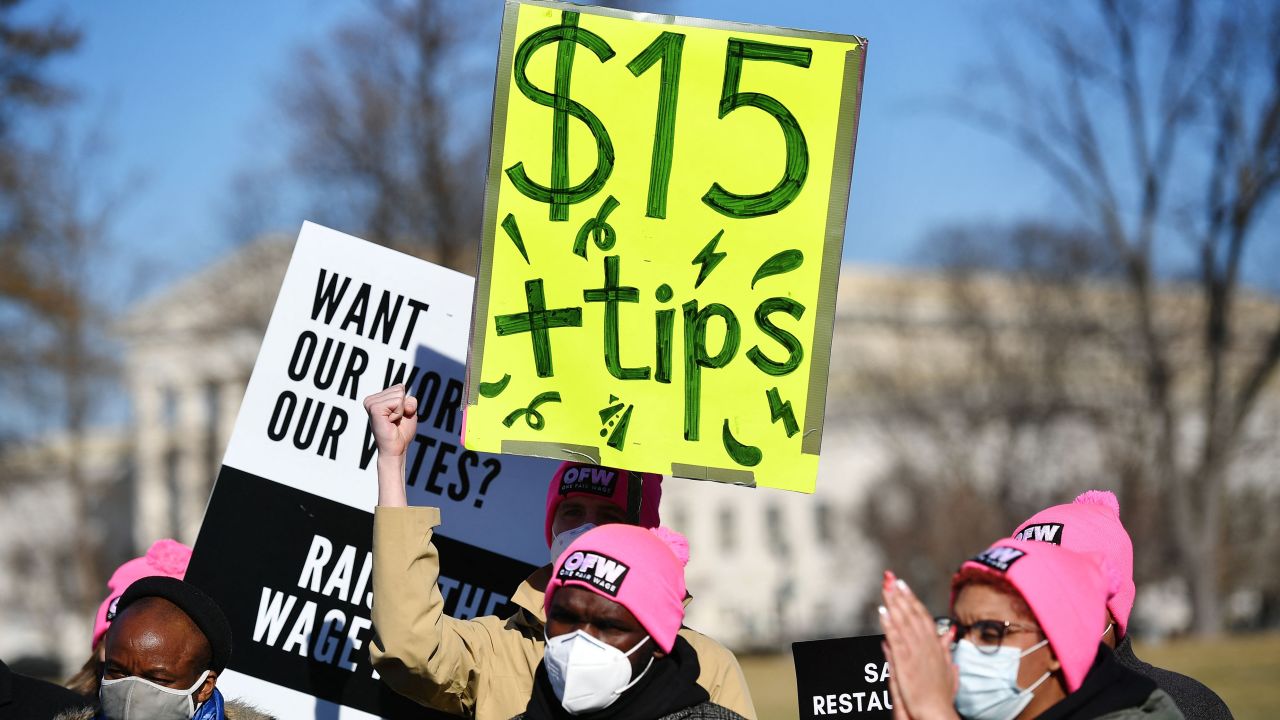The economic issues that will mark 2023 in the United States 7:50
(CNN) --
As President Joe Biden scored several legislative victories last year, voters across the country went to the polls in November to decide on some local measures.
Passage of several of those measures will lead to new state laws this year.
And in 2023, Americans will also feel the impact of several provisions of the Inflation Reduction Act that was signed into law over the summer.
These are some of the state and federal measures that will take effect in 2023.
Minimum wage increase
An activist holds a banner demanding a $15-hour minimum wage and tips for restaurant workers during a rally at the US Capitol on February 8, 2022.
Nearly half of all US states will raise the minimum wage by 2023.
The increase went into effect on January 1 in the following states: Arizona, California, Colorado, Delaware, Illinois, Maine, Maryland, Massachusetts, Michigan, Minnesota, Missouri, Montana, Nebraska, New Jersey, New Mexico, Ohio, Rhode Island , South Dakota, Vermont and Washington.
Workers earning the minimum wage in Connecticut will have to wait until June 1 to see the increase, while the change goes into effect in Nevada and Florida on July 1 and September 30, respectively.
The increase went into effect in New York on Saturday for workers outside of New York City, Long Island and Westchester County.
advertising
Of all the states, Washington state has the highest minimum wage at $15.74, up from $14.49;
followed by California, which now has a minimum wage of $15.50 for all workers, which has risen from $14 for employers with 25 or fewer employees and $15 for employers with 26 or more employees.
Yet the nation's capital, Washington, still has the highest minimum wage in the country.
An increase from $16.10 to $16.50 took effect on Sunday and another increase to $17 is set for July 1.
The push for a higher wage across the country comes after the federal minimum wage had stayed the same since 2009, the longest period without change since a minimum wage was established in 1938, according to the Labor Department.
Efforts by Democrats to pass a $15 minimum wage bill stalled in the Senate in 2021.
recreational marijuana
Five states -- Arkansas, Maryland, Missouri, North Dakota, and South Dakota -- had recreational marijuana on the ballot in the November midterm elections, with voters in Maryland and Missouri approving 21-and-over personal use.
While legalization has gone into effect in Missouri with an amendment to the state constitution, Maryland's law goes into effect on July 1.
The law will also allow people previously convicted of possession and intent to distribute cannabis to request expungement.
Starting January 1, the amount of cannabis a person can possess in Maryland for a fine rather than a criminal penalty increases from just over one-third of an ounce, or 10 grams, to 2.5 ounces.
insulin prices
One of the most significant victories for Biden in 2022 was the Reduce Inflation Act, a $750 billion health care, tax and climate bill, which he signed into law in August.
As part of the legislation, the price of insulin for Medicare beneficiaries will be capped at $35 beginning January 1.
About 3.3 million Medicare beneficiaries used insulin in 2020 and spent an average of $54 per prescription for insulin in the same year, according to the Kaiser Family Foundation.
The limit does not apply to people with private insurance coverage after Senate Democrats failed to get at least 10 Republican votes to pass the broader provision.
Electric Vehicle Tax Credit
There will be changes to the tax credits for those with electric vehicles, also thanks to the Inflation Reduction Act.
The new rule emphasizes the use of North American-made vehicles, requiring much of the battery components and final assembly to originate in the region to be eligible for tax credits.
It also requires that at least 40% of the minerals used for the battery be extracted from the United States or from a country that has a free trade agreement with the US.
Upon meeting the requirements, new vehicles are eligible for a tax credit of up to $7,500.
Those who purchase used electric vehicles can receive up to $4,000 in credits but these cannot exceed 30% of the vehicle's sales price.
Initially, those who buy vehicles in 2023 will have to wait to receive the tax credit when they file their tax returns for the year 2024. But starting January 1, 2024, buyers of electric vehicles will be able to receive the money immediately, at the point of sale, if they agree to transfer credit to your dealer.
CNN's Tami Luhby, Shawna Mizelle and Matt McFarland contributed to this report.

